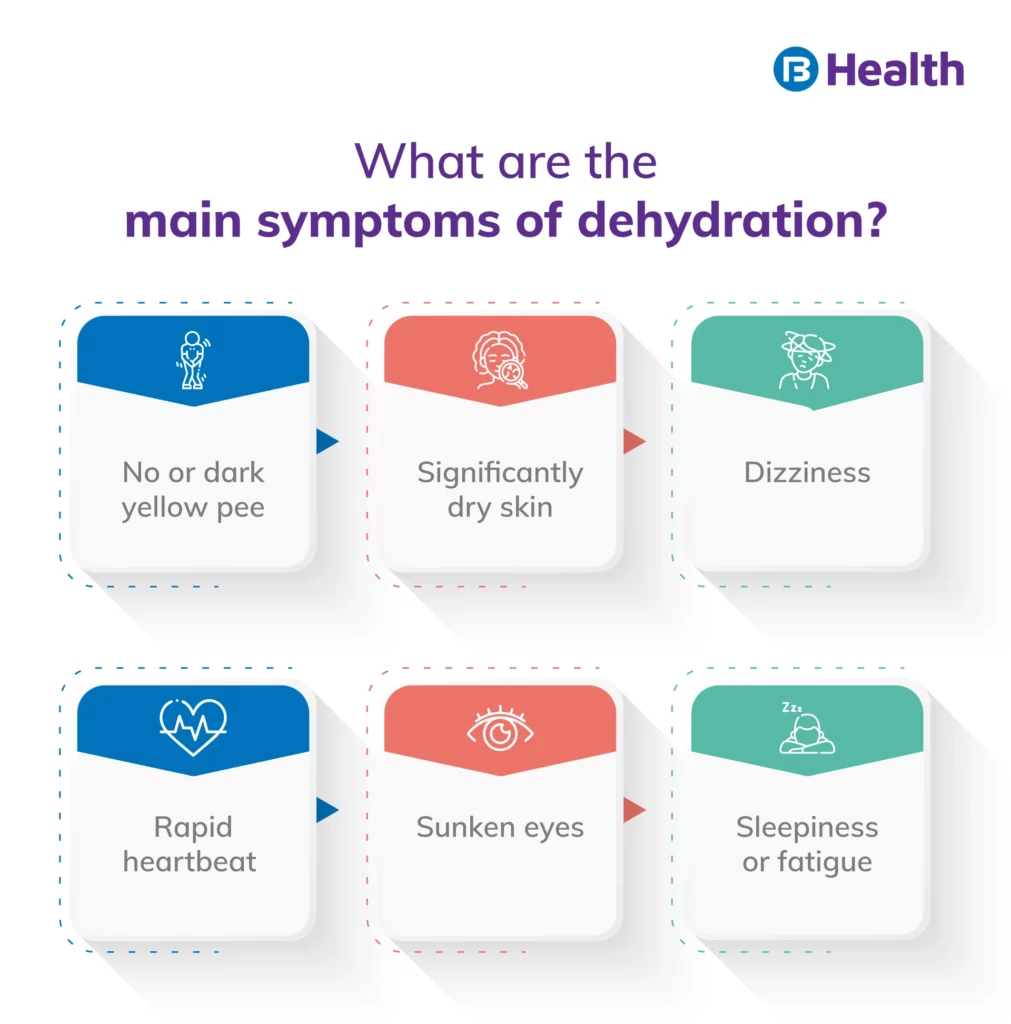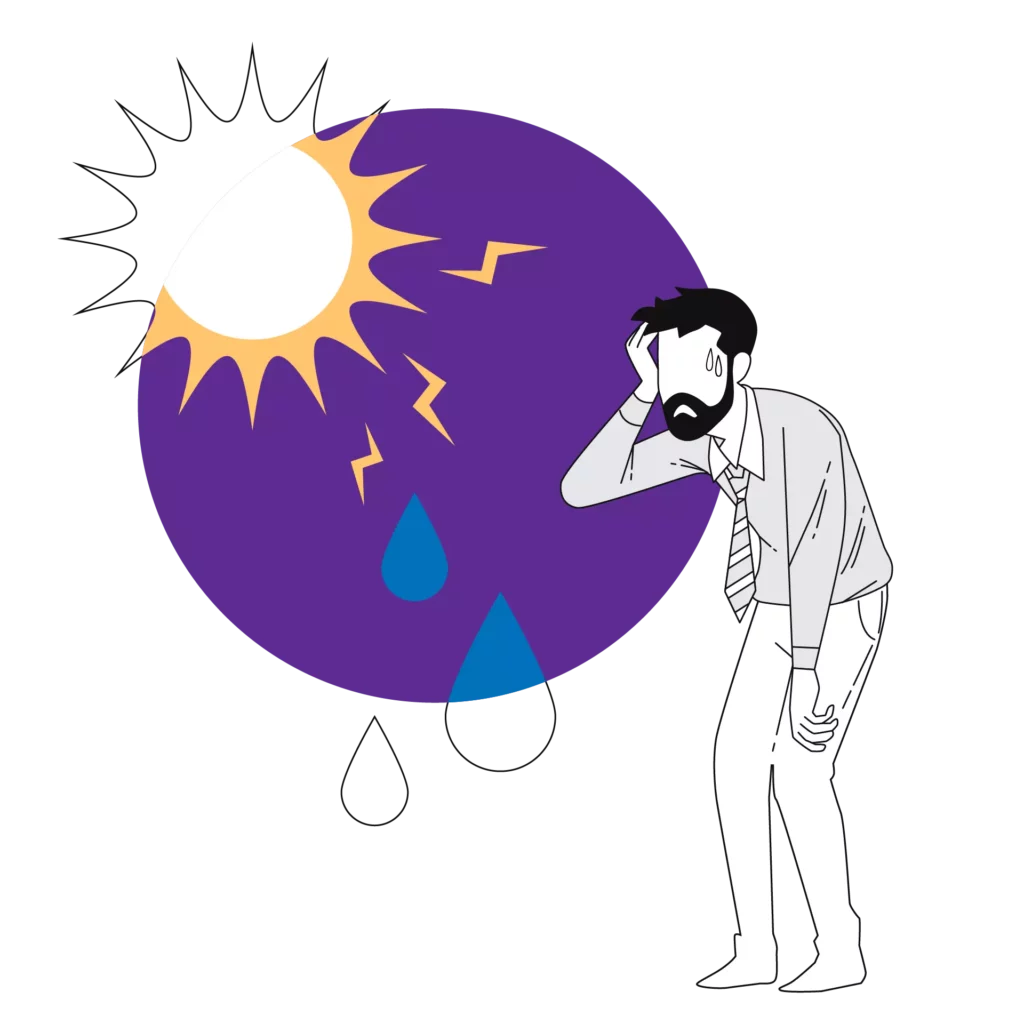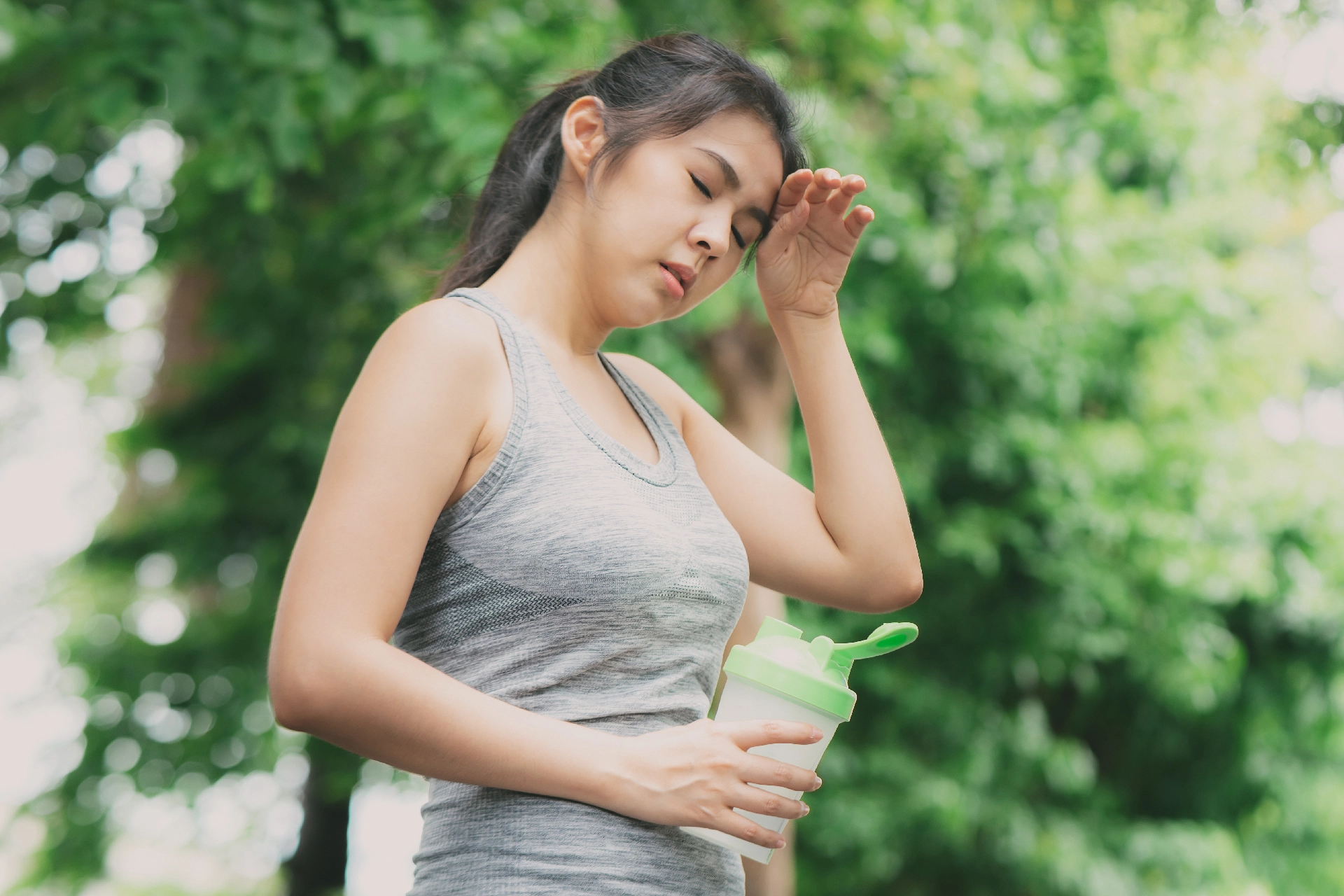General Health | 7 min read
Dehydration Early Signs, Causes, Complications, Diagnosis
Medically reviewed by
Table of Content
Synopsis
Losing water from the body is common; however, you risk dehydration if you don’t replenish it. Older adults, babies, and people suffering from diseases must be more careful than others. However, you may be able to prevent dehydration if you realise it at the right time.
Key Takeaways
- Your body loses water incessantly through sweating, vomiting, pooping, peeing, etc
- Symptoms of dehydration include dry skin, dizziness, fatigue, dark yellow pee, lack of peeing, etc
- Prevent dehydration by drinking enough water and increasing water intake during diseases and high-intensity workouts
What Are The Causes Of Dehydration?
How much water to drink a day depends on the person’s activity level, gender, and age. People with higher activity levels may need more water, including athletes. However, not drinking enough water to replenish may cause dehydration. Extreme water losses make cells, tissues, and organs incapable of functioning efficiently. Read on to learn what causes dehydration.The main dehydration causes include the following:
- Unusual water loss due to:
- Vomiting & Diarrhea: When you have diarrhea or vomiting, your body loses fluids. Vomiting and diarrhea may show dehydration symptoms and also cause a decrease in electrolytes in our bodies. Vomiting causes dehydration by expelling large quantities of water; in diarrhea, the large intestine fails to absorb it
- Excessive sweating: The body cools itself by producing watery fluids over the skin. This fluid is sweat, and its purpose is to create a cooling effect because the water vapors take away the body heat. Body sweat primarily contains salt and water. So excessive sweating causes water loss, and you may see dehydration symptoms
- Increased peeing: You urinate to remove waste. However, the body will lose lots of water if you start to pee a lot due to certain diseases, medications, or specific chemical imbalances, and this may cause dehydration
- Fever: Though you may not feel, the body reduces its temperature by losing fluids from your skin surface, which may lead to dehydration. Moreover, by using more water than usual, the body fights pathogens during fever
- Diabetes: High blood sugar level causes excessive urination as the body tries to remove sugar through pee. This may result in dehydration
- Forgetting to drink water throughout the day can lead to dehydration symptoms
- Not increasing the water uptake when exercising
- Avoiding water during sore throat or sick stomach
Early Signs Of Dehydration
The following are the early signs of dehydration:- Feeling thirsty
- Having dry mouth
- Peeing infrequently
- Having a dark yellow pee
- Experiencing cool and skin
- Suffering from headache
- Having cramped muscles

Dehydration Symptoms In Adults And Children
You may have severe dehydration if you experience the signs of dehydration mentioned below. This means you have lost around 10-15% of water content. [1]
Below are the severe dehydration symptoms:
- Not peeing at all or quite dark yellow pee
- Having significantly dry skin
- Feeling dizzy
- Experiencing rapid heartbeat
- Having sunken eyes
- Suffering from sleepiness or fatigue
- Fainting
Babies may experience slightly different dehydration symptoms:
They are as follows:
- Dryness in mouth and tongue
- Tearless crying
- Diapers are dry for more than 3 hours
- Eyes and cheeks appear sunken
- The top of the skull feels soft
Any person with the following dehydration symptoms must visit a hospital immediately:.
- Severe diarrhea
- Diarrhea for more than two days
- Vomiting for more than two days
- Disorientation
Treatment Available For Dehydration
Replenishing water content in your body is rehydration; you can do this by drinking or intravenously. However, people suffering from excessive vomiting or diarrhoea may not be able to dehydrate orally. In such a situation, you may need to supply water containing electrolytes through an intravenous tube.
If oral rehydration is possible, people suffering from dehydration should drink fluids containing electrolytes but with low sugar.
You can also make an oral rehydration solution at home to eliminate the effects of dehydration:- Add half a teaspoon of salt and six teaspoons of sugar in one-liter water. Ensure that you don’t add excess sugar or salt. Keep drinking it to stay hydrated
How Is Dehydration Diagnosed?
A general physician consultation is necessary if you notice any dehydration symptoms. Doctors will take the following steps to diagnose:
- Check your symptoms and analyze if they are dehydration symptoms
- Measure your vitals, including heartbeat and blood pressure, as you may have low blood pressure and high heart rate during dehydration
- The doctor will order tests for electrolytes as dehydration often results in lower electrolytes [2]
- You may also have to get your creatine levels measured, which indicates if the kidneys are functioning properly
- Doctors may also order a urinalysis that tests the presence of bacteria in urine and tells about the electrolyte levels in the body. Moreover, the doctor will inspect the colour of the urine as a dark yellow pee implies dehydration

What Can Be The Possible Dehydration Complications?
Treating patients diagnosed with dehydration is crucial. You may get heat exhaustion, cramps, and other complications if left untreated. Severe dehydration may also cause seizures, blood loss, and kidney failure. Read about them below in detail:
- Heat exhaustion & heat stroke: Heat exhaustion occurs when you lose too much water. You might start showing symptoms, including cold and moist skin and rapid heart rate. It becomes a heat stroke if you don’t treat it. In heat stroke, your body loses its ability to cool down, and the temperature may quickly shoot up to 106 degrees
- Seizures: With the loss of electrolytes, your nerve signals don’t move travel properly, causing seizures
- Blood loss: Lack of water can result in a reduced quantity of blood in the body as blood is mostly water
- Kidney failure: High or frequent dehydration can make the blood thick and harder to filter, clogging the kidneys. This can damage the kidneys over time
- Coma: A person suffering from severe dehydration can go into a deeply unconscious state called a coma
To avoid dehydration complications, children and older adults must visit the hospital even if the dehydration is mild. However, adults can increase their water intake and check if the dehydration symptoms go away.
Additional Read: World ORS DayRisk Factor Associated With Dehydration
Dehydration can be a problem for anyone. However, certain people are more likely to experience dehydration symptoms, including babies and older adults, and people who are ill, have chronic diseases or are active outside.
- Babies may lose water during diarrhea, vomiting, and high fever, and it can result in dehydration symptoms
- Older adults may forget to drink water or have difficulty getting around and accessing water
- Chronic disease is a risk factor for dehydration. People with chronic diseases, including diabetes, have a higher chance of getting dehydration due to excess peeing
- Dehydration symptoms may include excessive sweating that is harmful to the body
Ways to prevent it
Even though rehydration is a potential solution for dehydration, your focus should be on preventing it.
- During diarrhea and vomiting ensure you increase your water intake through fluids, including juices or electrolyte-containing water. Plain water may create an electrolytic imbalance, causing dizziness
- Similarly, people during heavy workouts also must increase their water intake. A sports drink low in sugar would be beneficial, as these contain electrolytes
- Avoid getting direct sunlight during hot seasons and wear light, summer-friendly clothes that don’t make your body warm
- Make it a habit of drinking enough fluids even if you are not thirsty so you won’t forget it. But ensure you don’t consume excess water, or it may create an electrolyte imbalance
References
- http://journals.rcni.com/doi/abs/10.7748/en2007.07.15.4.22.c4247
- https://www.ncbi.nlm.nih.gov/pmc/articles/PMC7149330/
Disclaimer
Please note that this article is solely meant for informational purposes and Bajaj Finserv Health Limited (“BFHL”) does not shoulder any responsibility of the views/advice/information expressed/given by the writer/reviewer/originator. This article should not be considered as a substitute for any medical advice, diagnosis or treatment. Always consult with your trusted physician/qualified healthcare professional to evaluate your medical condition. The above article has been reviewed by a qualified doctor and BFHL is not responsible for any damages for any information or services provided by any third party.





